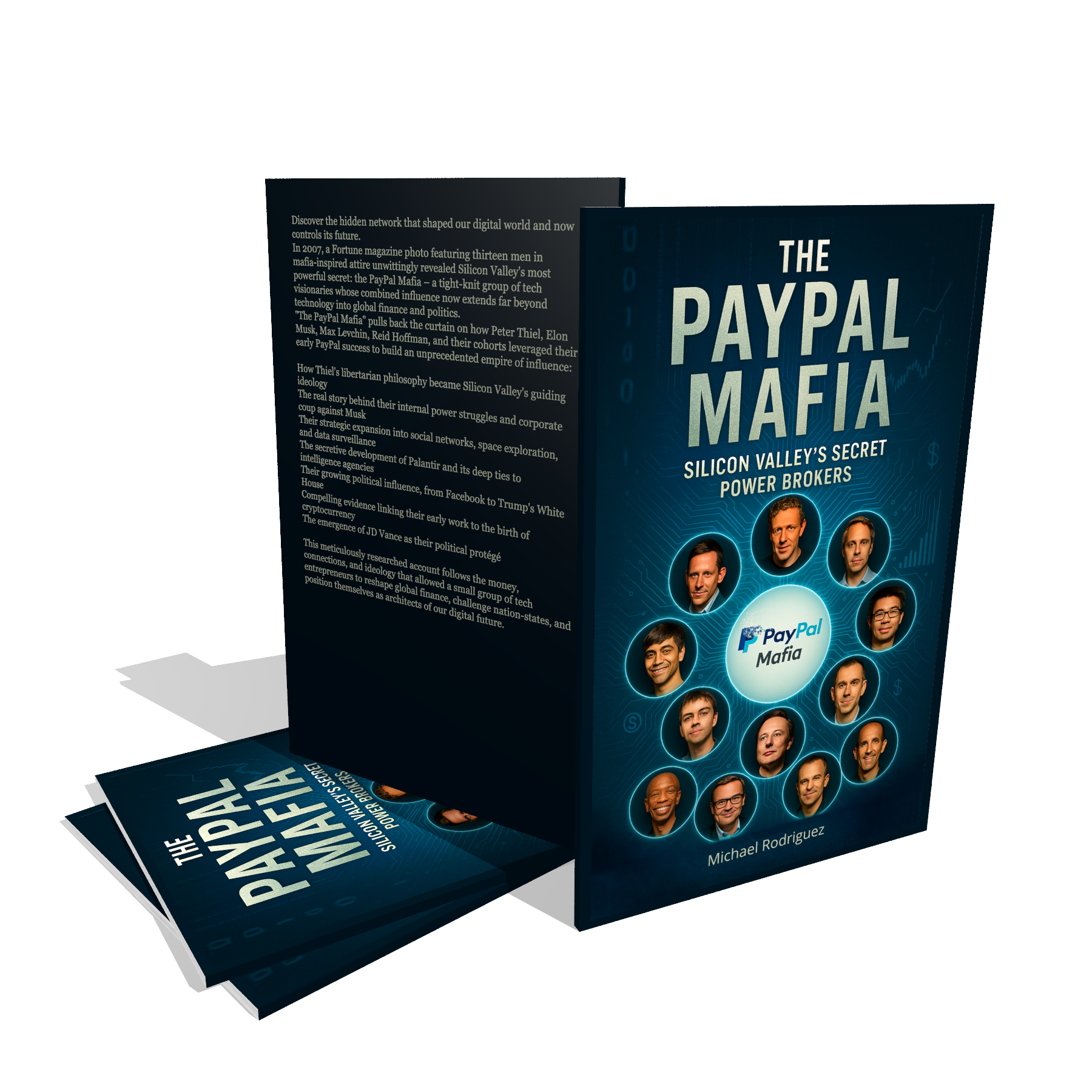The PayPal Origin Story: How A Small Startup Created Silicon Valley's Most Powerful Network
 Michael Rodriguez
Michael Rodriguez
This article features insights from my book "The PayPal Mafia: Silicon Valley's Secret Power Brokers"
The Photograph That Changed Everything
In 2007, Fortune magazine published a now-iconic photo: thirteen men in gangster-inspired suits, posing with cigars and playing cards. The headline read "The PayPal Mafia," introducing the world to a group whose influence would reshape technology, finance, and eventually global politics.
What few understood then—and what my extensive research has uncovered—is that this wasn't just a group of successful entrepreneurs who happened to work at the same company. It was the beginning of a carefully orchestrated power network that would go on to control trillions in assets and fundamentally alter how technology companies operate.
Beyond The Famous Names
Most people recognize Elon Musk, Peter Thiel, and perhaps Reid Hoffman from the original photograph. But the PayPal network extends far beyond these household names:
Max Levchin - The Ukrainian immigrant who provided PayPal's cryptographic foundation and later founded Affirm
David Sacks - COO at PayPal, founder of Yammer, and now influential venture capitalist and political advisor
Keith Rabois - The operational genius behind multiple billion-dollar companies
Roelof Botha - Former PayPal CFO who became one of the most successful venture capitalists at Sequoia Capital
The Investment Thesis That Changed Silicon Valley
What made the PayPal alumni uniquely successful wasn't just technical skill or business acumen—it was a shared investment philosophy that gave them unprecedented advantage.
The core principles included:
Network-driven monopolies - Investing in companies that become more valuable as they grow
Founder-controlled businesses - Supporting technical founders who maintain voting control
Zero to One innovation - Prioritizing completely new markets over incremental improvements
Long-term horizons - Maintaining investments through multiple economic cycles
This philosophy led them to early investments in Facebook, SpaceX, LinkedIn, YouTube, Yelp, Palantir, and dozens of other world-changing companies.
The Libertarian Connection
Perhaps most fascinating is how the libertarian principles that guided PayPal's creation have evolved into significant political influence. Through my research, I've tracked how the network's:
Combined political donations exceed $500 million
Think tank funding shapes public policy debates
Media investments influence public discourse on technology regulation
Support for specific candidates has altered political landscapes
Why This Matters For Today's Entrepreneurs
The PayPal story offers crucial lessons for anyone building technology companies today:
Team composition is destiny - The original PayPal team's diversity of thought (libertarians, conservatives, progressives) created productive tension
Crisis forges lasting bonds - Surviving PayPal's near-bankruptcy and post-9/11 challenges created unbreakable trust
Cultural alignment outlasts business models - Their shared values survived even as their business approaches diverged
The Next Generation
Today, we're seeing the emergence of "PayPal Mafia 2.0" networks forming from companies like Stripe, Airbnb, and Coinbase. Will these networks achieve similar influence? Only time will tell.
For the complete investigation into Silicon Valley's most powerful network, explore my book here.
Buy Now https://books2read.com/b/3GgVza
Subscribe to my newsletter
Read articles from Michael Rodriguez directly inside your inbox. Subscribe to the newsletter, and don't miss out.
Written by

Michael Rodriguez
Michael Rodriguez
Michael Rodriguez is a renowned economic analyst and investigative journalist specializing in the intersection of technology, finance, and political power. With over fifteen years of experience researching global power structures and financial markets, Michael brings a unique perspective to understanding how technological innovation transforms society and reshapes traditional power dynamics. "The PayPal Mafia: Silicon Valley's Secret Power Brokers" represents his most comprehensive investigation into the network of entrepreneurs and investors who have fundamentally altered the technological landscape and are now increasingly influencing political systems worldwide. His previous works include "The Trillion Dollar Shadow: Vanguard, John Bogle, and the New Financial Order," which explored how index investing transformed the economic landscape; "The Chinese Real Estate Bubble," a comprehensive analysis of China's economic model; "Stoicism in Business," examining the application of ancient philosophical principles in modern entrepreneurship; "Technological Breakthroughs of World War II: How War Changed Our World"; and "Silver Empire: The Forgotten Metal That Powers Modern Civilization." Michael's interdisciplinary approach combines economic analysis, technological expertise, and political insight, allowing him to trace the complex connections between Silicon Valley's innovators and their growing influence on global governance. His work on the PayPal Mafia illuminates how a small group of visionaries have leveraged their initial success in digital payments to reshape multiple industries and challenge traditional state authority. A frequent speaker at technology conferences and economic forums, Michael has been featured in publications including The Wall Street Journal, The Economist, and Wired. He holds degrees in Economics and International Relations from Georgetown University and previously worked as a financial analyst before dedicating himself to full-time research and writing. Through his meticulous research and accessible writing style, Michael continues to decode complex power systems for readers seeking to understand the hidden forces shaping our technological future and its implications for democracy in the digital age.